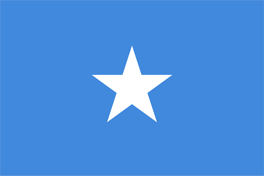 |
Republic of SomaliaIndependence 1 July 1960
History The population of Somalia, a crossroads and area of dynamic trade in the Horn of Africa, is mainly nomadic. The 19th century construction of the Suez Canal reinforces its strategic position. Somalia includes the former Italian Somalia (Mogadiscio) and the former British Somaliland (Aden). The British administer the Barbary Coast beginning in 1877. The Italians wage war against the other Somalia beginning in 1885 (the Massaouah occupation) and take over from the Omani (the Oman Sultanate), but they lose their colony during the Second World War. The French, Italians, Russians, Americans and British compete for regional influence. The United Nations places the three sectors of Somalia (British Somaliland, Italian Somalia and the adjacent part of Ethiopia) under British, Italian and French control. Nationalism grows much more slowly in the British protectorate of Somaliland than it does in Somalia: in 1943, the 'Somali Youth League' founded by Raji Mohammed Hussein demands independence for Greater Somalia, which would encompass all territory inhabited by the Somali people. On 1 April 1947, the Ligue de la jeunesse somalie is created to unite the Somali and avoid inter-community prejudice and friction. Abdullahi Issa becomes prime minister in 1956. The British protectorate ends on 26 June 1960: on 1 July Somalia gains independence and the two territories are joined to form the Republic of Somalia. This provokes border skirmishes between Somali, Ethiopians and Kenyans. Somalia proposes combining all Somali into a single state, but African states reject this. Prime Minister Abdirashid Ali Shermarke and President Aden Abdullah Osman attempt to recreate the pre-colonial 'Greater Somalia', since many Somali find themselves in neighbouring countries – Kenya, Ethiopia and in the French sector of Somalia, which becomes independent as Djibouti in 1977. To achieve this, Somalia aligns itself with the Soviet Union and other communist countries. On 21 October 1969, the Somali government is overthrown by a military coup and General Siad Barre becomes president. Currently, Somalia remains embroiled in civil war. Jacob Sabakinu Kivilu (UNIKIN) |


